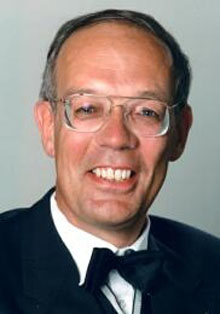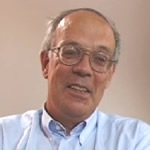Bert Sakmann
Bert Sakmann ( born June 12, 1942 in Stuttgart ) is a German physician. He was awarded in 1991 together with Erwin Neher of the Nobel Prize in Physiology or Medicine. Both scientists were awarded the prize for the development of the patch -clamp technique.
Bert Sakmann is former Director of the Department of Cell Physiology at the Max Planck Institute for Medical Research in Heidelberg. Sakmann habilitated at the Georg -August- University of Göttingen and research at the Max Planck Institute for Biophysical Chemistry in Göttingen. Since 2008 he has headed the Emeritus Group Functional Anatomy of a cortical column at the Max Planck Institute of Neurobiology in Martinsried. He is also head of Sakmann research group at the Institute for Neuroscience at the Technical University of Munich.
Life
In 1948, he attended elementary school in Lindau. He graduated from high school in 1961 at the Carriage Museum Gymnasium in Stuttgart. Subsequently, he studied until 1967 medicine at the universities of Tübingen, Freiburg, Berlin, Paris and Munich. After the medical state examination at the Ludwig- Maximilians- University of Munich, he was a medical assistant in 1968 at Munich University and a research assistant at the Max Planck Institute for Psychiatry in Munich, Department of Neurophysiology at Otto Detlev Creutzfeldt. In 1971 he went to the University College London, Department of Biophysics, Bernard Katz and graduated in 1974 his medical dissertation entitled electrophysiology of neural light adaptation in the cat retina (Faculty of Medicine, University of Göttingen ) from.
In 1974 he went back to Otto Creutzfeldt doing research now at the Max Planck Institute for Biophysical Chemistry in Göttingen. Since 1979 he was in the group Membrane Biology department of permanent staff. In 1982 he habilitated with Scripture observation of transmitter -receptor interaction at the molecular level: high-resolution current measurements on small membrane areas of single cells and cell-free membrane fragments at the Medical Faculty of the University of Göttingen and in 1985 director of the Department of Cell Physiology at the Max Planck Institute for Biophysical Chemistry, Göttingen. In 1987 he became full professor at the Medical Faculty of the University of Göttingen and he was awarded the Gottfried Wilhelm Leibniz Prize of the Deutsche Forschungsgemeinschaft awarded.
In 1988 he became a corresponding member of the mathematics and science class of the Bavarian Academy of Sciences, in 1988 Director of the Department of Cell Physiology at the Max Planck Institute for Medical Research, Heidelberg, after which he accepted in 1990 a professorship at the Faculty of Natural Sciences Medicine, University of Heidelberg. A year later he was appointed as Full Professor at Heidelberg University at the Faculty of Biology. Meanwhile, Emeritus Scientific Member of the Max Planck Institute for Medical Research, he leads an Emeritus since 2008 at the Max Planck Institute of Neurobiology.
In 1986 he was awarded the Louisa Gross Horwitz Prize - 1991 by Ralph W. Gerard Prize in 1989 with a Gairdner Foundation International Award. In 1991 he got together with Erwin Neher, with whom he had worked in Göttingen, awarded the Nobel Prize in Physiology or Medicine for her development of a method for the direct detection of ion channels in cell membranes for the study of signal transduction within the cell and between cells. In 2006 he was awarded the Erasmus Medal of the Academia Europaea.
Sakmann founded the Bert Sakmann Foundation, which is managed by the Alexander von Humboldt Foundation. He became a corresponding member of the Academy of Sciences in Göttingen in 1992. He was elected by the Heidelberg Academy of Sciences and Ordinary Member 1993. In the same year he became a member of the German Academy of Sciences Leopoldina, since 2008 National Academy of Sciences elected.
From summer 2009 Bert Sakmann will take up a position as scientific director of the Max Planck Institute for Biomedicine in Florida. This facility will be the first branch of the German research organization in the United States. Sakmann will lead a research program that is focused on the bio-imaging of structures of the cerebral cortex ( neocortex ).









